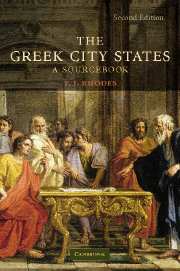Book contents
- Frontmatter
- Contents
- List of Maps
- Preface to the First Edition
- Preface to the Second Edition
- Map 1 The Greek World
- Map 2 Attica
- Introduction
- 1 The Homeric State
- 2 The Archaic State
- 3 Economic and Political Development; Tyranny and After
- 4 Sparta
- 5 Athens
- 6 Women and Children
- 7 Economic Life
- 8 Religion
- 9 Other Cities
- 10 Beyond the Single City
- 11 The Hellenistic and Roman Periods
- Bibliography
- Index of Texts
- Index of Names and Subjects
3 - Economic and Political Development; Tyranny and After
Published online by Cambridge University Press: 05 June 2012
- Frontmatter
- Contents
- List of Maps
- Preface to the First Edition
- Preface to the Second Edition
- Map 1 The Greek World
- Map 2 Attica
- Introduction
- 1 The Homeric State
- 2 The Archaic State
- 3 Economic and Political Development; Tyranny and After
- 4 Sparta
- 5 Athens
- 6 Women and Children
- 7 Economic Life
- 8 Religion
- 9 Other Cities
- 10 Beyond the Single City
- 11 The Hellenistic and Roman Periods
- Bibliography
- Index of Texts
- Index of Names and Subjects
Summary
By the eighth century the Greeks were recovering from the primitive conditions of the dark age. As life became more secure and more prosperous, there was increasing contact among the Greeks, and between the Greeks and their non-Greek neighbours (the ‘barbarians’, people whose language was an unintelligible babble). Population grew, to the point where (in bad years, if not in all years) there was not enough home-grown produce to feed everyone: the problem was solved partly by trade, to import food (and other commodities in short supply at home, such as metals), and partly by exporting surplus population to apoikiai (‘colonies’), settlements around the coasts of the Mediterranean and the Black Sea which usually became independent city states in their own right.
This growth was thus a cause of tension within the cities. Although for a long time land remained the principal form of wealth, the availability of luxury goods from the east, and the possibility of a successful trading voyage, enabled a few men to become rich whose fathers or grandfathers had not been rich, while natural disasters or divison between too many sons might impoverish an old-established family whose wealth had seemed secure. (The adoption of that most hoardable and transportable form of wealth, coinage in precious metal, is now thought not to have occurred until near the middle of the sixth century, but precious metal was available earlier than coinage.)
- Type
- Chapter
- Information
- The Greek City StatesA Source Book, pp. 31 - 57Publisher: Cambridge University PressPrint publication year: 2007



